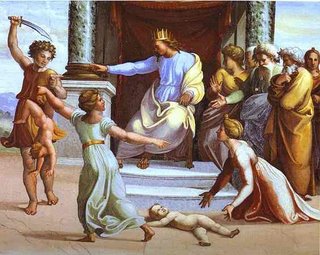When the Church banned Christmas

"It is therefore ordered by this court and the authority thereof that whosoever shall be found observing any such day as Christmas or the like, either by forbearing of labor, feasting, or any other way, upon any such account as aforesaid, every such person so offending shall pay for every such offence five shilling as a fine to the county."
From the Records of the General Court, Massachusetts Bay Colony, May 11, 1659
It's that season again when communities get all worked up about holiday displays and what can be shown there and retail clerks get ulcers worrying about whether or not they can say, "Merry Christmas" to those who come into their stores. In churches there is often the angst around who gets to be Mary in the Christmas pageant, whether a Christmas tree should be in the sanctuary and, if so, how it should be decorated.
Church programs are at full tilt, pastors prepare for multiple services, choirs are hard at work on cantatas, and church leaders fret that town regulations no longer allow hand-held candles at their candlelight services. And of course most everybody, both inside the church and out, is participating in keeping the economy afloat by buying things for people who, in most cases, don't really need them.
As many Christians get all worked up over "Keeping the Christ in Christmas," I've come to wonder if Jesus really would want his name associated with the holiday as it stands. And as I wondered that, I remembered my early experience as a Reference Assistant at the John Carter Brown Library at Brown University.
The JCB is a rare book library specializing in Americana up to the year 1800, and in my time there I volunteered to work on a Christmas exhibition for our reading room. What I discovered in my research, however, was that Americans did not celebrate Christmas before 1800. In fact, the celebration of Christmas was actually banned in the Massachusetts Bay Colony in 1659 and anyone caught celebrating had to pay a five-shilling fine.
And who got it banned? Why, the Christians, of course. The ban lasted 22 years, but it wasn't until the middle of the 19th century before Christmas celebrations were really accepted as appropriate in religious circles. Consider this statement by the Rev. Increase Mather in 1687:
"The generality of Christmas-keepers observe that festival after such a manner as is highly dishonourable to the name of Christ. How few are there comparatively that spend those holidays (as they are called) after an holy manner. But they are consumed in Compotations, in Interludes, in playing at Cards, in Revellings, in excess of Wine, in mad Mirth ..."
Consider also the very earliest Christians. Christmas was not an important festival in the Church for several centuries after Christ's death. The three big Church festivals were Epiphany, Easter, and Pentecost. Jesus' birth was relatively unimportant compared to the events that revealed his nature (Epiphany), his death and resurrection (Easter), and the bestowal of the Holy Spirit (Pentecost).
All of that makes me wonder if Christians perhaps should quit worrying about keeping the Christ in Christmas and simply let it be the time of warm sentiment, festive parties, and economic activity that it has become. Suppose we took the Christ OUT of Christmas and instead put Him back in Epiphany where He belongs?
Honestly, are even our Christmas Eve services accurately described as "holy"? They are sentimental, to be sure, and that is fine. I love a beautiful candlelight service as much as the next person. But I wonder sometimes if all our cooing over a baby Jesus isn't a way of guarding ourselves against the older Jesus. Jesus as a baby can't make us uncomfortable. He can't overturn our tables or tell us to love our enemies or to put away our swords. He just smiles at drummer boys, receives expensive presents from important people, and (if you're to believe the carols) doesn't even cry! Who wouldn't want a baby like that?
But the baby grows up, and as he does, the crowds of Christmas dwindle. Those who want to keep the Christ in Christmas often do not want him intruding at other times of the year. Like tax time, for example. We're only back again when Jesus has gotten through His life and that nasty execution and is safely resurrected and ready to offer us eternal life. Presents given to Him at birth are returned to us in Easter salvation and we get to avoid all those difficult lessons in-between.
Keep the Christ in Christmas if you will, but personally I think it's more important to put Him back in the rest of the year.
Labels: Anne Robertson, ban, Christ, Christianity, Christmas, church, Jesus, Massachusetts Bible Society


